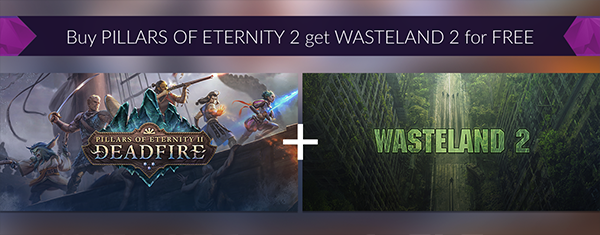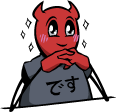-
Welcome to rpgcodex.net, a site dedicated to discussing computer based role-playing games in a free and open fashion. We're less strict than other forums, but please refer to the rules.
"This message is awaiting moderator approval": All new users must pass through our moderation queue before they will be able to post normally. Until your account has "passed" your posts will only be visible to yourself (and moderators) until they are approved. Give us a week to get around to approving / deleting / ignoring your mundane opinion on crap before hassling us about it. Once you have passed the moderation period (think of it as a test), you will be able to post normally, just like all the other retards.
You are using an out of date browser. It may not display this or other websites correctly.
You should upgrade or use an alternative browser.
You should upgrade or use an alternative browser.
People News Colin McComb and Gavin Jurgens-Fyhrie have left inXile
- Thread starter Infinitron
- Start date
Wasteland 1 sure but Wasteland 2 is very politically correct, there are faggots everywhere (which is ridiculous in a post-apocalyptic setting). It's one of the reasons why I haven't pre-ordered W3 despite liking it.At face value both W2 and TTON were at odds by their very nature. Wasteland is in-house, satirical, self-deprecating and doesn't care for political correctness.
Sounds like you sourced a German bootleg.Wasteland 2 is very politically correct
...what if I told you someone at inXile is a Polack, Goral? Would you buy it then? lolI haven't pre-ordered W3 despite liking it.
Last edited:
Forest Dweller
Smoking Dicks
- Joined
- Oct 29, 2008
- Messages
- 12,379
Yeah, so what's up with that?It's a somewhat lulzy touch that a casual visitor to this site will see an 'Obsidian developer' giving McComb and TTON both barrels
IHaveHugeNick
Arcane
- Joined
- Apr 5, 2015
- Messages
- 1,870,558
You know.. I find it hard to believe that someone working in the industry and sweating his bread would find it possible to say this kind of stuff about qualities of artistic labour of a colleague
My friend, this website is Whistleblower Central. Monty Markland, Chris Avellone, me. We're all doing our utmost best to correct the trajectory of games industry.
It will be interesting to see where they will land and who will replace them at inXile (or maybe inXile will remain with fewer writers now).
Merger incoming?
Next step: Buying out (the walking corpse of) Interplay.

Last edited:
Prime Junta
Guest
Where Colin will go after this is still unknown.
Hopefully the oven.
That developer tag has done terrible things to you my friend
it's what working at obsidian does to folks
IHaveHugeNick
Arcane
- Joined
- Apr 5, 2015
- Messages
- 1,870,558
That developer tag has done terrible things to you my friend
You know what IHaveHugeNick , you're all right.

Archibald
Arcane
- Joined
- Aug 26, 2010
- Messages
- 7,869
It's a somewhat lulzy touch that a casual visitor to this site will see an 'Obsidian developer' giving McComb and TTON both barrels
I hope that some journalist will pick this up and publishes this as: "Obsidian developer talks shit about inXile, inXile refused to comment on the story".
...what if I told you someone at inXile is a Polack, Goral? Would you buy it then? lol
Potato stronk!
iguana_trader
Educated
- Joined
- May 3, 2018
- Messages
- 64
Not to derail the thread (haven't played W2 yet), but why is it ridiculous to have gays in a post-apo setting? Homos were present throughout the ages, even in cultures that were not accepting towards them. Gay men are just born (it may be different with women, as their sexuality is wired a bit differently), and they can be born into a nazi heil hitla family. If you bother to read some papers on that, you will see that, unless you are one of those who say: "LOL send them fags to an island and see how their civilization prospers!" - then receive my condolences (they would die out ofc if there were no females, but new buch of homos would be born elsewhere).Wasteland 1 sure but Wasteland 2 is very politically correct, there are faggots everywhere (which is ridiculous in a post-apocalyptic setting). It's one of the reasons why I haven't pre-ordered W3 despite liking it.At face value W2 and TTON were at odds by their very nature. Wasteland is in-house, satirical, self-deprecating and doesn't care for political correctness.
If homomen were to be open about their sexuality and be to survive without being killed by some ragers, I wager a post-apo USA could be a good fit for them. Maybe not the middle east, but then you have places like Afghanistan and there is a lot of hypocrisy on that subject in Islam in general (i.e. "lets push this guy off te roof, but after we inseminate this boi with our sperm endlessly for 24h").
There is also the fact of man to man intimacy while not being of a homosexual orientation, like in Ancient Greece - believe it or not most of them weren't gay - the man sex stemmed from their culture. Greeks revered two war heroes and that idolatry of masculinity led them to man to man relations. Notice I avoid calling them gay, that is because they had no word in their language corresponding to "gay" or "homo" of our new languages. Alexander the Great's mother expressed her sorrow in her son, as he was not interested in women. I think Josh Sawyer (or other writer) used that a little for FNVS, namely the Legion (but they were larping Romans and not the Greeks, as Americans would). If you want a modern example of that, then str8 male prostitutes or porn actors, hell even regular folk, who have a M2M buttsex attest to that - one can be a hetero with no erection towards another male but still have sex and enjoy it. Just like gays had relations with women in the past in order to hide.
TLDR: there is no escaping from buttsex even if you are str8 - show me your honour!
Prime Junta
Guest
MRY I have no doubt whatsoever that CMcC is a thoroughly nice person and very pleasant to work with. I don't think many people even here dispute that.
The trouble is that a thoroughly nice person can't make the kinds of games he's been attempting to make at inXile. Just look at the title of the game. It says "torment."
TORMENT.
Look it up. It's not a nice word. A thoroughly nice person can't make a game about torment. You need someone who's plumbed some dark depths of the soul. If you really don't want to make anyone feel bad, it just doesn't work.
I get the distinct impression that this was one of the fundamental problems with T:ToN. You're all tremendously nice people, one of you runs a freakin' orphanage for crying out loud. That reflects well on you personally, but doesn't make for a game about torment. It might even have adversely affected the development of the game -- I mean, there are some good bits there (not least some parts you wrote), but also a tremendous amount of cruft that should have been shot down in that really extended pre-production period. It's like there wasn't anyone there with the ability to say "this is shit, cut it out and think of something better," even politely couched.
The trouble is that a thoroughly nice person can't make the kinds of games he's been attempting to make at inXile. Just look at the title of the game. It says "torment."
TORMENT.
Look it up. It's not a nice word. A thoroughly nice person can't make a game about torment. You need someone who's plumbed some dark depths of the soul. If you really don't want to make anyone feel bad, it just doesn't work.
I get the distinct impression that this was one of the fundamental problems with T:ToN. You're all tremendously nice people, one of you runs a freakin' orphanage for crying out loud. That reflects well on you personally, but doesn't make for a game about torment. It might even have adversely affected the development of the game -- I mean, there are some good bits there (not least some parts you wrote), but also a tremendous amount of cruft that should have been shot down in that really extended pre-production period. It's like there wasn't anyone there with the ability to say "this is shit, cut it out and think of something better," even politely couched.
This is one of the most retarded thing I've ever heard. I guess Chris was pretty tormented in his twenties since he made a great game about Torment.A thoroughly nice person can't make a game about torment. You need someone who's plumbed some dark depths of the soul. If you really don't want to make anyone feel bad, it just doesn't work.
Also From Software must be full of mentally damaged people if they could create Dark Souls or Bloodborne.
Prime Junta
Guest
This is one of the most retarded thing I've ever heard. I guess Chris was pretty tormented in his twenties since he made a great game about Torment.
You can always ask him how tormented he was.
One thing he wasn't though was afraid of offending people or making them feel bad.
...they are Japanese.Also From Software must be full of mentally damaged people if they could create Dark Souls or Bloodborne.

Van-d-all
Erudite
TTON is far from a bad game. It's probably the best SF game ever made, with the exception of the more action-centric KotOR.
Coming from someone with Deus Ex 1 avatar

- Joined
- Jan 28, 2011
- Messages
- 100,144















This is one of the most retarded thing I've ever heard. I guess Chris was pretty tormented in his twenties since he made a great game about Torment.
You can always ask him how tormented he was.
One thing he wasn't though was afraid of offending people or making them feel bad.
I don't necessarily disagree with this line of argument, but with the caveat that to some it might look like you think PS:T is some edgy/nihilistic game. I recall it being full of moments of humane kindness, it was not the work of some angry adolescent.
Prime Junta
Guest
I don't necessarily disagree with this line of argument, but with the caveat that to some it might look like you think PS:T is some edgy/nihilistic game. I recall it being full of moments of humane kindness, it was not the work of some angry adolescent.
It absolutely was. But it also had some really dark moments, and the humanity would not have counted for shit without that darkness.
Quantomas
Savant
- Joined
- Jun 9, 2017
- Messages
- 260
Let me recapitulate this: They aimed at Planescape Torment and hit a fan boy that thinks that the game would be a success and better if they would have just named it Perry Rhodan.
The thing is the writing in Perry Rhodan never was good. But the themes they envisioned and the larger story arcs were epic.
But then it was in the days before SF grew into the full force it is now, with writers like Isaac Asimov, Larry Niven and Arthur C. Clark testing the waters. SF really began to take off with writers like Iain M. Banks, Gregory Benford, Greg Bear et al. Today it truly has grown into a mainstream phenomenon, with Worldcon its best showcase.
The writing in ToN is nothing like Perry Rhodan, though it has quite a few epic arcs. The concept at the core of Numenera, the seven civilizations reaching imaginable heights and then vanishing, is brilliant and defines the setting. Naturally ToN is using the numenera as a story vehicle. The great arcs are the cast-offs, the plot around the mind labyrinth, Miel Avest and the Bloom (ever visited it with max intelligence?), but also side quests like the civilization-spanning story of the people on the space station (Anchorage) and the Tabath (a warrior race). The writing in general is excellent. The game's weakness is mostly that often it cannot do the level of writing justice. For example, the resolution of the quest in the Anchorage felt too simplistic, although its presentation is quite complex.
Of course it has weaknesses, like that the mind labyrinth never feels like it has been developed to its full potential, and that the main plot around the Sorrow suffers from illogical flaws. It is claimed that the Sorrow is very much a local phenomenon centred on Earth and associated with the civilizations that it harboured, but at the same time it is said that the Changing God has visited other parts of the galaxy and other universes. He should always have been capable of finding the means to defeat or escape the Sorrow. An accomplished outstanding SF writer could easily have remedied these plot holes.
This is probably the biggest failing of ToN, that it is a game with story arcs that make gigantic strides in a vast setting, and that ultimately the game mechanics needed to be realized better. Which most likely has its cause in funding limits and the way the game was developed.
Easy.$4,188,927
pledged of $900,000 goal
74,405
backers
How do you market "spiritual successor to obscure cult-classic" besides appealing to the fans of said classic? Brian did his job.
"Hey folks, we are deeply appreciative of your support and the chance to make this game happen. As you know, we had a good number of brain storming sessions with our creative and writing team, and discussed how we could do the Torment legacy justice. In fact, we are not sure that we could do Torment justice ever. What we will do is to craft a game that is close to what we outlined during the Kickstarter, but in future we will drop all references to Torment from our presentation because we believe ToN will stand on its own feet squarely. If you have any suggestions for features that brings us closer to honoring the Torment legacy, please bring these up in the forum and we will discuss their merits."
The problem with ToN, which became more apparent around its launch, was that it didn't know how to present itself proper and what its true audience actually is.
The Ninth World trailer is brilliant.
But take the story trailer which is outstanding in its own way, it paints a picture of a gritty and action focused game. This is a complete mischaracterizaton of the game. Add to it that the title says Torment and the game's cover can easily be interpreted as body horror, it's not surprising that people who never experienced PST would be kept at bay. It's a case where the brilliant marketing material produced by Techland worked against the game, because the claims these made (new take on combat, the Tides as a personal experience etc) would easily be questioned by the not so favorable user reviews.
ToN is a very slow burn SF experience with a ton of highlights. In the current market, it's probably worth a trilogy of SF books, something like $15 to $20.
You are right. I meant to say the best SF game with the exception of the more action-centric games, like KotOR, Mass Effect, Destiny, and Deus Ex of course.Numenera is not science fiction. I don't even think it could be called soft science fiction (like Dune). It is science fantasy at most, or just fantasy, likewise with KotOR and Star Wars as a whole. And calling it the best SF game is certainly stupid when there are far better games with an SF setting, like Deus Ex, and games that explore science fiction themes far more deeply like SOMA or Prey.TTON is far from a bad game. It's probably the best SF game ever made, with the exception of the more action-centric KotOR.
But ToN is science-fiction and not fantasy. That the inhabitants of the world can't make sense of the numenera doesn't change its core premise, an Earth that has seen numerous civilizations rise and fall, and that it is technology that remains.
Last edited:
That would've been blasphemy to a certain party. Thankfully, reappropriating development funds to the sane party gave us an improved Wasteland 2.It's like there wasn't anyone there with the ability to say "this is shit, cut it out and think of something better," even politely couched.
Chris Avellone Would you share us your mental state when you made PST? Did you had the darkness in you which is essential to make a Torment game?This is one of the most retarded thing I've ever heard. I guess Chris was pretty tormented in his twenties since he made a great game about Torment.
You can always ask him how tormented he was.
One thing he wasn't though was afraid of offending people or making them feel bad.









![Glory to Codexia! [2012] Codex 2012](/forums/smiles/campaign_tags/campaign_slushfund2012.png)
![Have Many Potato [2013] Codex 2013](/forums/smiles/campaign_tags/campaign_potato2013.png)
![The Year of Incline [2014] Codex 2014](/forums/smiles/campaign_tags/campaign_incline2014.png)















